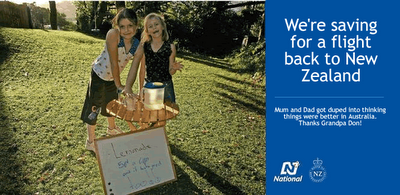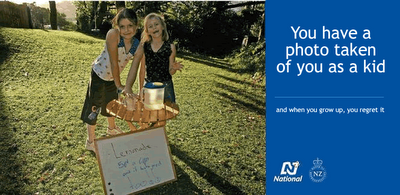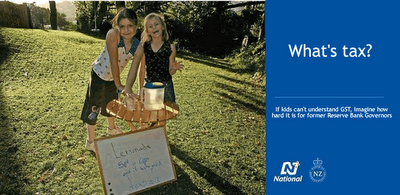
I'm disturbed with the ephemera today's Herald has on Maori
I'm with Shane Jones (Labour, List) on this: what's wrong with a bilingual sign? it would seem to be the most equitable solution to the problem; it allows the Kura Kaupapa to assert the need for promoting Te Reo Maori, and it is in line with the bilingual status in New Zealand.
As to the Land Transport Safety Authority’s specious argument that the sign would put children at risk, I remember that road signs are supposed to be interpreted, not only by what is written on them, but by their unique but identifiable symbolism. That’s why Stop signs are octagonal and red, and not turquoise and trapezoid. Although judging by the Herald picture, the sign is possibly not to regulation (in terms of its appearance, other than the wording I mean), it's either pretty close, or a simple alteration could make it so.
Is LTNZ expecting us to make our own interpretations about road signs…give New Zealand drivers some credit!
If anything, it makes it look pretty pathetic, especially when combined with business confidence in Auckland is up again.
To them, nothing short of complete Ministerial override will be sufficient, jeopardising the whole point of devolving to local Government.
Every Blogger Counts, has been active, although with limited intensity, since July 2005. A look at the website, puts confuses noone about the local supporters in the blogosphere. But I was bewildered by the following;
“Every Blogger Counts is a coalition supported by up to 290 blogs and up to thousands of individual supporters.”
Where? Who? I could make up numbers too.
It has been even handed enough, if not polite to link to “The Anti Smacking brigade” including NGOs and Government agencies/QUANGOs.
Perhaps the more potent pieces written in opposition to repeal have been on Dave Crampton’s Big News blog but as the media buzz intensifies, the blog is sure to pick up the pace.
Fresh out of the blocks, and with no clear authorship, Repeal 59 is on the web, with posts from pro repeal supporters. They have decided to keep a polite tone, by not linking to supporter blogs or the opposition. It’s certainly a lot clearer as to its purpose:
Many of New Zealand's most reputable child and family advocacy organisations are united in the campaign to repeal section 59 of the Crimes Act. Repeal gives a clear message that hitting children is not OK.
I will be interested to see how this blog goes, as well if some sort of internecine war develops, I hope not.
What happens when you don't check your email inbox all day
Published Friday, June 09, 2006 by Geoff Hayward.
It’s pretty clear that the current leadership of National wishes to hold steady on its race and Treaty policy, it’s a stance that has captured the core voter group (What Jon Johansson calls the angry, white male) but locks them out of the urban liberal vote, crucial to winning in 2008. Any deviance in the policy framing and National could haemorrhage support.
But Labour has got problems too. Labour is suffering from a major image problem with Maori, and this looks to destabilise Labour’s once vaulted unity. But more importantly, it suggests a strategic shift by the Labour Leadership to move away from Maori. A tactic that works well so long as National holds fast (and thus allows Labour to maintain the liberal vote: a quiet withdrawal from the race issue)
The question is where are they going?
Suffocate the Maori Party
One tactic is to remove the influence of the Maori party. Come the next election, Labour would have to win most or all of the seats captured by Maori in 2005. Likewise, the numbers suggest that there may be no increase in Maori seats. With the Maori party caucus destroyed, the party will lose it’s effectiveness in the House and so it would be presumed, would shift Maori back to their traditional Labour standing.
This is a dangerous and difficult tactic. First, Labour will have to find high quality candidates. The Labour brand has been tarnished in terms of electorate candidates. They will need to find a phalanx of Shane Jones’ and John Tamihere (without the latent sexism and an inbuilt sense of political instinct), to win the confidence of Maori. But many Maori leaders aren’t looking to join the party. A shadow has descended on the party, one that will stay so long as those who were crucial in the foreshore debate stay within the party. This strategy is also dangerous for the sake of fracturing the already cool relationship between Labour and the Maori party. Should this tactic fail at the polls, then Labour may need to go cap in hand to the Maori party for supply and confidence.
Ignore them
This is also a flawed strategy. Maori voters did not support the Maori party whole heartedly, splitting their vote dramatically to Labour. What it shows is that Maori want Labour to work with the Maori party, so the voters want harmony between the two. Of course, the major assumption is that this trend will continue through the next election, and based on the unlikelihood of National shifting tone, it certainly will.
The problem is that if Labour get voted out, they lose a large amount of resources to communicate with Maori. As it stands, Maori Ministers can utilise their resources to a Maori electorate even without holding the seats themselves. But in opposition it’s a different story, so to stay in Labour will have to consider the need to gain the support of the Maori party’s support. Combine that with the probability of the Maori party maintaining their seats should Labour either not contest or place weak candidates up; in fact an ignorant Labour party could lose all their Maori seats to the Maori party.
Remove the head, keep the body
It seems clear that both parties would work a lot better, should either of the leaders of Labour or the Maori party be replaced. Tariana Turia is the weaker politically. Her co leader Pita Sharples (Maori, Tamaki Makaurau) is far more elegant in the public, and whose mana is regarded well by other MPs in the House. He is the true leader of the party and seems likely to not be burdened by personality conflicts, like Turia has. PM Clark could leave before the next election, but the uncertainty of who will replace her would make it difficult to ascertain how the inter-party relationship will change. Otherwise it is likely that both parties can work together on issues, both acknowledge the urgent need for the economic transformation of Maori, but the challenge not to remove the safety net that is just holding those statistical failures. Certainly nothing from any other party seems to show an acknowledgement of this reality. A strong candidate to elect over Turia would remove this thorn in Labour’s side.
Surgical strikes
A similar approach to the problem is to retake in addition to Turia’s seat, the urban Maori seat of Tamaki Makaurau, provided a high profile candidate is found. This is by far the easiest of the seats to retake, considering the latent urban support for Labour so far. But taking this seat comes at a cost, losing Sharples from the mix, dangerous in terms of wanting to keep him in Parliament so he can lead the party. Another close contest is looming in Te Tai Tokerau, should Shane Jones (Labour, List) run against Hone Harawira (Maori, Te Tai Tokerau), meaning the end of Labour stalwart Dover Samuels (Labour, List). Waiariki is going to be an interesting electorate, a cleavage between the Maori party and Te Arawa Trust board over the lakes settlement could either be a mountain or a molehill in terms of Te Ururoa Flavell’s (Maori, Waiariki) support. Labour could also lose seats as well, with a loss of resources in the lost electorates so it will have to be a balancing act, to use the party resources where they are most likely to gain support.
The Party Vote
In any case, Labour needs to maintain the Party vote. There is an untapped area of support, but requires a strategy that empowers Maori to vote at all. Fear will not cut it, it did not in the last election (although overall the voter turnout increased, Maori voter turnout rates did not rise significantly) and considering the equality of all party votes, it seems ludicrous not to find support in Maori. Furthermore, the high rates of disallowed and informal votes; votes which do not count, casted by Maori mean that the real voter impact of Maori is even less than the voter turnout percentages suggest. Labour and the Maori party could benefit from working together on voter education and registration drives, and may at least at the extra-parliamentary level, lead to a better working relationship.
What about policy?
MMP has certainly allowed the larger parties to give up some of its policy flanks. Labour does not try to aggressively go after the green vote, a tactic that National is trying, following overseas examples. This may explain the shift of Labour’s funding priorities away from Maori, exposed recently in the media. However as it stands, Labour certainly seem more appealing, they are either not prepared to change anything that would create major opposition from Maori in contrast to National’s policies. But they aren’t putting anything fresh on the menu either.
There are number of unexplained factors in this debate, that would take too long to articulate at the moment, but there is considerable flux in Maori political culture, and the party or parties working together could foster more political involvement and inclusion for a growing Maori population, but also go a long way to securing the party’s wider objectives.
Authors
- Geoff Hayward
- Owner, Moderator, Author
- Contact Me

Last posts
- The end of an era
- The Bubble hits the airwaves
- 2007 Treaty Debate Series at Te Papa
- The Dom on the money with political apathy
- Australian Universities beat NZ at level of invest...
- Midterms: my breakdowns
- Why?
- Humour - Politicians Sweep Midterms
- Rumsfeld's fall...wrangling the news cycle
- Sale of Liquor (Youth Alcohol Harm Reduction: Purc...
Archives
- October 2005
- November 2005
- December 2005
- January 2006
- February 2006
- March 2006
- April 2006
- May 2006
- June 2006
- July 2006
- August 2006
- September 2006
- October 2006
- November 2006
- January 2007
- March 2007
- January 2008
News
- Scoop
- NZ Herald
- Stuff
- TVNZ News
- Watea News
- Watea News (Blog)
- Infometrics
- The Independent NZ
- The Listener
- Radio Live
- IMC Aotearoa
- International Herald Tribune
- Agence Française de Presse
- The Independent
- The New York Times
- The Washington Post
- CNN
- BBC World
- Agenda TV (NZ)
- The Guardian
- Reuters
- TIME Pacific Edition
- Mana Magazine Online
- Te Karere Ipurangi
- Jane's
- Al Jazeera
- Sky News UK
- Slashdot
- FAIR
- Asia Times
- Raw Story
- The World in Context
- Associated Press
- PRAVDA
- New Scientist
- Consumer
- PC World NZ
- ZMag
- Otago Daily Times
- Radio New Zealand
- Newstalk ZB
- Molesworth & Featherston
- Tangata Whenua
- Arawa News
- Jerusalem Post
- Islamic Republic News Agency
- Times Newspapers
- India Times
NZ Political Parties
Blogs
-
Left
- Public Address
- Just Left - Jordan Carter
- TUMEKE! - Tim Selwyn
- No Right Turn
- Aucklander At Large - Jeremy Greenbrook
- Fighting Talk (Scoop)
- Kete Were
- Bloggreen Aotearoa
- Capitalism Bad; Tree Pretty
- Joe Hendren
- Anarchia
- PhilosophicallyMade
- Random Contributionz
- ThreePointTurn
- Maria Von Trapp
- Genius NZ
- ObservatioNZ
- Onan's
- The Long Dark Teatime Of The Soul
- Jarvis Pink
- Red Fish
- Valorizing Labour
- Interesting Times
- Red Confectionary
- Prog Blog
- Socialist Free Haven
- Sparrows Are Cool - Graeme Edgeler
- Oh Crikey!
- Oswald Bastable's Ranting
- The Probligo
- The Penthouse
- On The Right - Mike Heine
- Lindsay Mitchell
- Liberty Scott
- Kiwi Log
- Too Right
- Whinging In New Zealand
- Writeups
- Spirit of 76
- Julian Pistorius
- James Gribble
- GMan Inc.
- NZ Pundit - Gordon King
- Sir Humphrey's
- WhaleOilBeefHooked
- Not PC - Peter Cresswell
- KiwiPundit
- ZenState
- Andrew Falloon
- Kiwiblog - David Farrar
- Insolent Prick
- I Hate Socialism
- KeaBlog
- SageNZ
- Michael's World
- NZ Meritocracy
- New Zeal
- Who Cares?
- Generation XY
- Adam Hamilton
- Walking The Right Path
- The Everlasting Man
- Duncan Bayne
- Clint Heine
- Rodney Hide
- Frogblog
- ACT On Campus
- NZAID Field Blog
- Brian Boyko
- The Holden Republic
- LAWS179: Elephants and the Law
- Nga Korero O Te Wa
- Metcalph
- Whoar
- The Briefing Room
- GoNZo Freakpower
- Subversnz
- NZBC
- Big News
- Jack Yan
- Hitchen's Watch
- Queen and Country
- Daily Kos
- Canadian Progressive Bloggers
- Left Center Left
- Labour First
- Lean Left
- Obsidian Wings
- Political Animal
- Steve Gilliard
- TalkLeft
- Turning the Tide
- Nick Barlow
- Atrios
- Atrios
- Baghdad Burning
- Drudge Report
- Poll Bludger
- Orcinus
- Histomast
- Lenin's Tomb
- Empires Fall - Steve Brady
Right
Party/Parliament/Government
Centrist
Overseas
Links
- Parliament
- The Beehive
- NZ Legislation
- NZ Political Policies
- World Stock Indices
- Statistics NZ
- World Currencies
- Weather Underground
- Wises NZ
- Elections New Zealand
- Reserve Bank of NZ
- NZX Sharemarket
- WTO
- World Bank
- IMF
- OECD
- United Nations
- US House of Reps
- The White House
- US Gov Web Portal
- Waitangi Tribunal
- NZ Election Study
- WINZ Statistics
- NZ Health Statistics
- NZ Education Statistics
- Uncorrected Question Time Transcripts
- NZ Treasury
- NZ Government News
- CommoNZ Parliamentary Database
- Parliament Publications
- Hansard
- NZ MP Directory
- NZ Govt Portal (www.govt.nz)
- Open Democracy
- Fact Check USA
- Planet of the Journals - NZ Blog Aggregator












